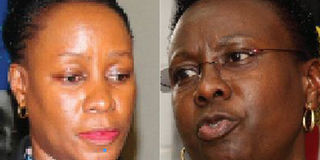Ministers disagree on midwives’ arrests

Youth minister Florence Nakiwala Kiyingi and Health minister Ruth Aceng
What you need to know:
- Because of such a specter, the country, experts fear, will not achieve the Millennium Development Goal to reduce maternal deaths to 131 per 100,000 live births by 2025 cognizant that there is already a malignant maternal health situation where 16 mothers die daily, during child labour in Uganda.
Jinja. The Minister of Health, Dr Ruth Aceng, has disagreed with her counterpart in charge of Youth and Children Affairs, Ms Florence Nakiwala Kiyingi, on a proposal to arrest midwives who do not report to police underage mothers seeking antenatal care at health facilities.
Ms Nakiwala, while presiding over the launch of Uganda Women’s Network report on gender roles last week, said if midwives report underage mothers, it would be easier to track and arrest men responsible for the pregnancies.
However, Dr Aceng said her colleague’s proposal would escalate maternal mortality rate since young mothers will shun visiting health centres.
While launching a Shs2b private ward (Grade A) at Jinja Regional Referral Hospital on Sunday, Dr Aceng in a message delivered by the Commissioner-in-charge of emergency medical services, Dr John Baptist Nambohe Waniaye, said arresting midwives will scare away teenage mothers from accessing health services for fear of being questioned about the man responsible for the pregnancy.
Community based approach
She said as a ministry, they opt for community based approach where clan leaders, religious leaders, parents and village chairpersons will work together in fighting teenage pregnancies.
She said: “The culprits are in the community - not in hospitals - telling midwives to report child mothers and arrest those who defy the directive will not work.”
“The role of midwives is to ensure that these young mothers have a safe delivery by encouraging them to attend antenatal,” she added.
“We now call upon the Church, clan leaders and other community leaders to intervene because this job cannot be ably done by the health workers. They only see the end result. The girl just comes when she is 12-years-old and is also carrying another baby. The midwife may not prevent teenage pregnancy but the community is capable of making the prevention,” she explained.
Dr Aceng warned that Busoga Sub-region has the highest number of teenage pregnancies in the country which must be handled through community dialogue.
“The Ministry of Health has guided that before the 18 years of age consent, a girl child is not yet physically and psychologically prepared to get pregnant. It is up to our leaders to end the high rate of teenage pregnancies because as a ministry, we have played our role in the management of obstetric emergencies,’’ she added.
The 2016 Uganda Demographic and Health Survey (UDHS) indicated an improvement in the health indicators, with the maternal mortality rate steadily declining from 524 in 2001 to 438 in 2011 to the current 368 per 100,000 live births.
Warning
Ms Betty Angatai, the executive director of Save the Young Mothers Uganda, a Mayuge District-based non-profit organisation, warned that arresting midwives will increase cases of fistula, unsafe abortion and a surge in Traditional Birth Attendants (TBA).
“Arresting these midwives will compel them to stop working on child mothers yet pregnancy exposes these girls to serious consequences such as premature labour, prolonged labour, obstructed labour, fistula, anaemia and maternal death while giving birth because their bodies are not prepared to have children,’’ she said.
Ms Angatai advised that the only option is to arrest parents and village chairpersons who settle defilement cases with culprits to fight the vice.
“We have seen many cases of village chairpersons and parents settling defilement cases with the defilers in exchange for money and quick dowry. Most parents have declined to report such cases to police for fear of losing dowry; so, instead of arresting midwives, police should arrest those who promote defilement by concealing the evidence,’’ she said.
Nationally
In Uganda, teenage pregnancy is worrying and is among the highest in the world with reportedly 24 per cent.
This trend has seen one in every four girls aged between 15 and 19 either pregnant or having given birth.
Because of such a specter, the country, experts fear, will not achieve the Millennium Development Goal to reduce maternal deaths to 131 per 100,000 live births by 2025 cognizant that there is already a malignant maternal health situation where 16 mothers die daily, during child labour in Uganda.



